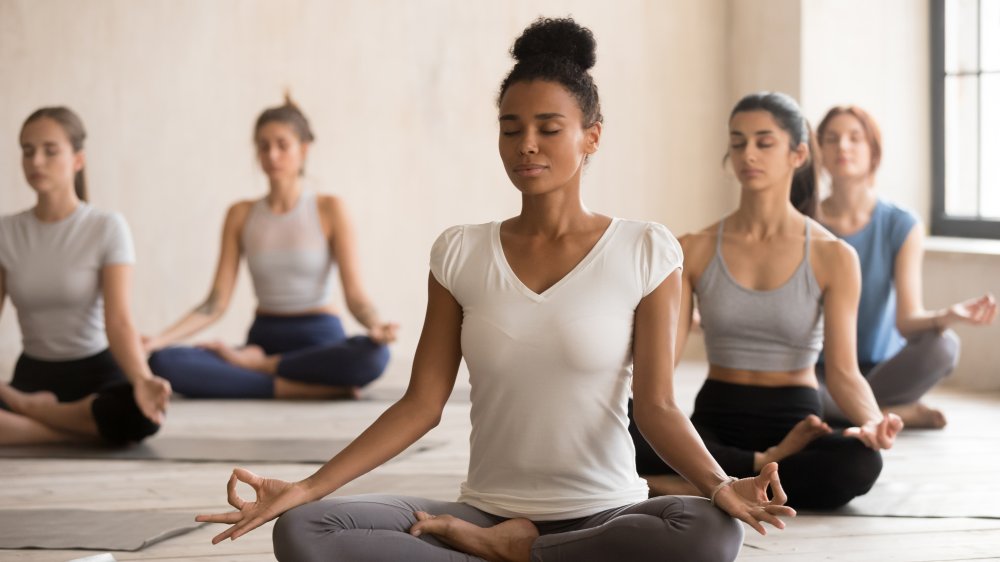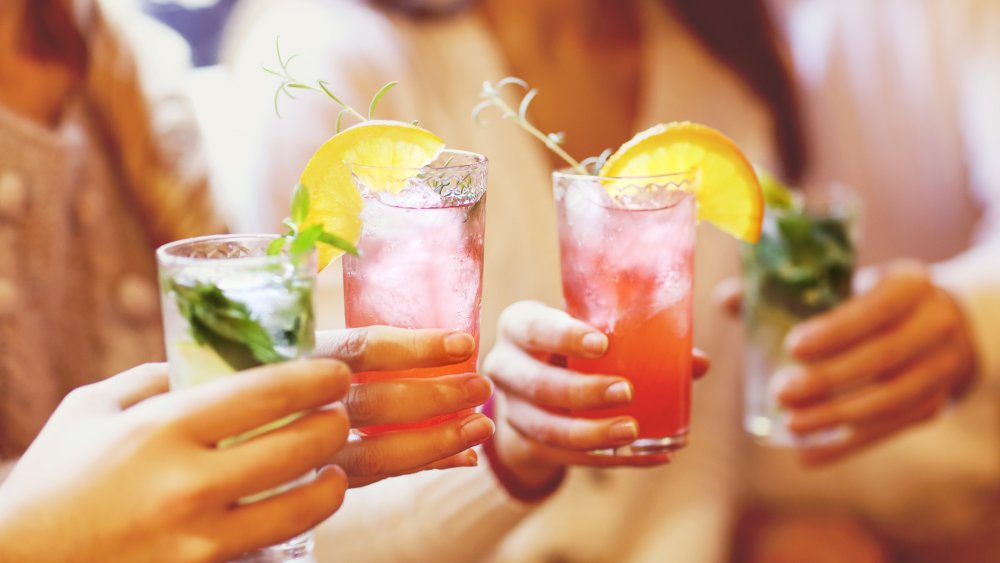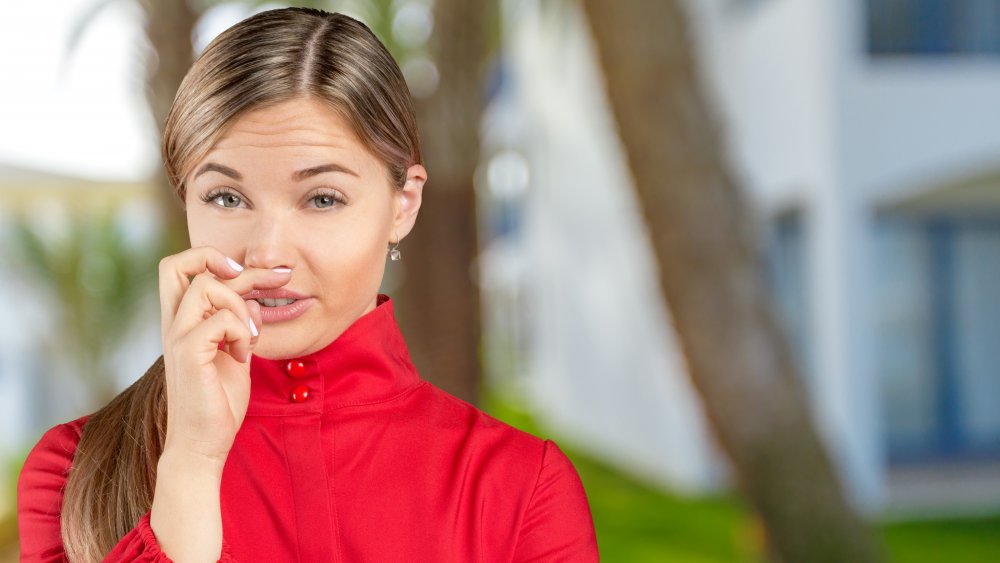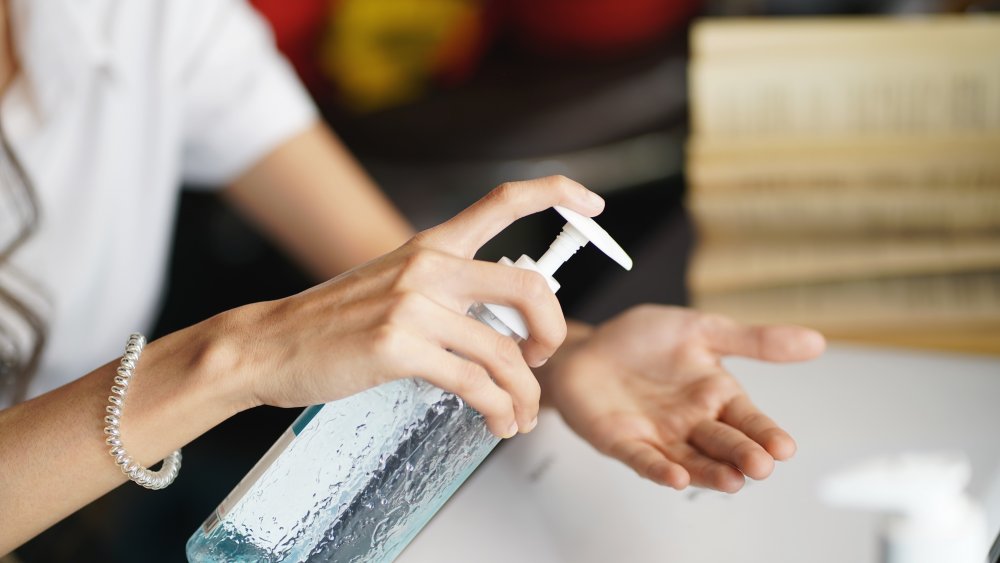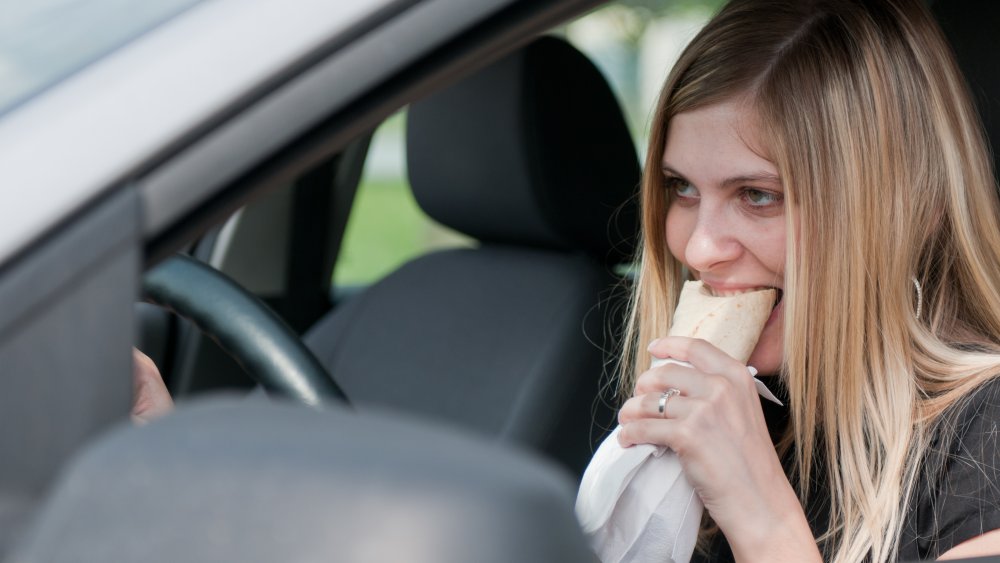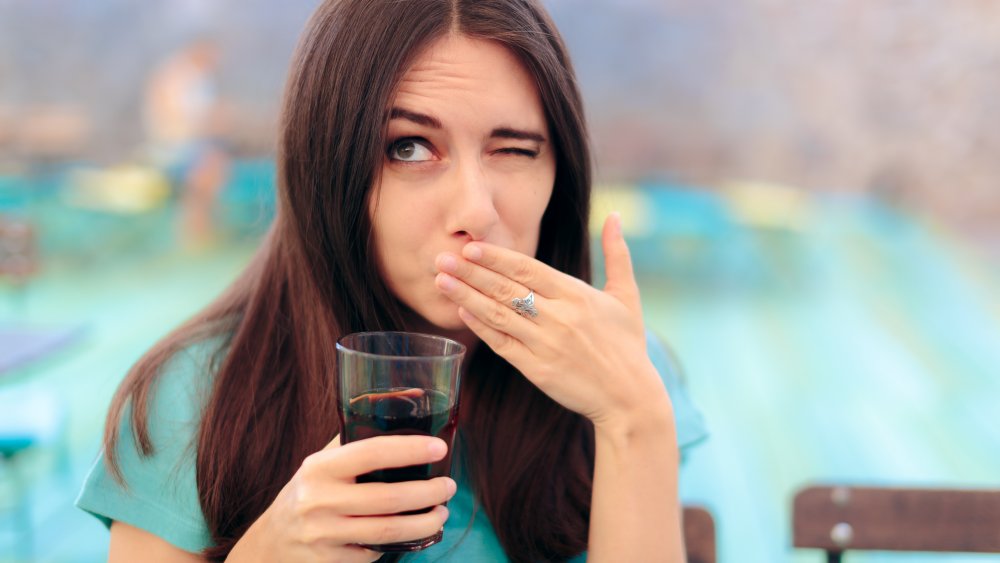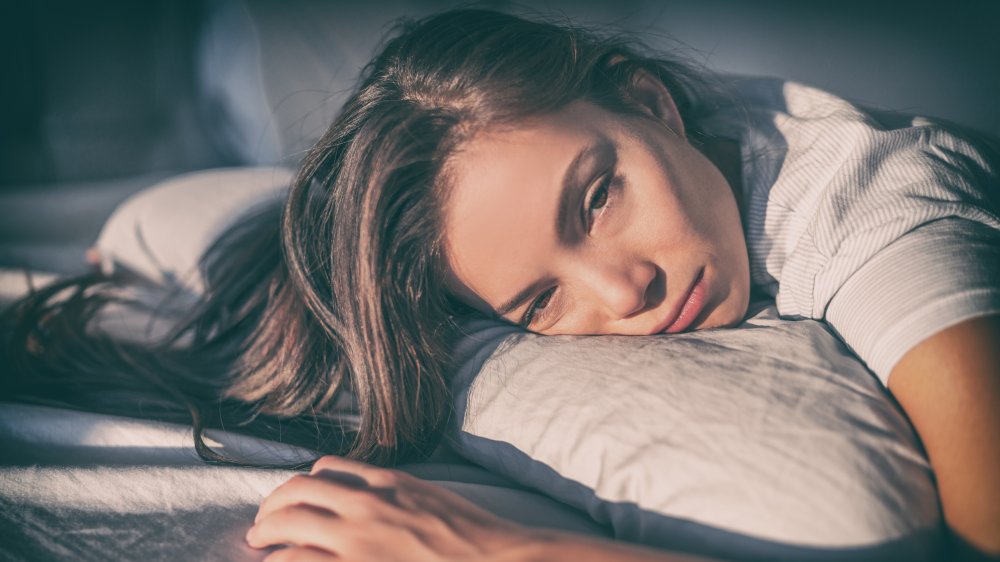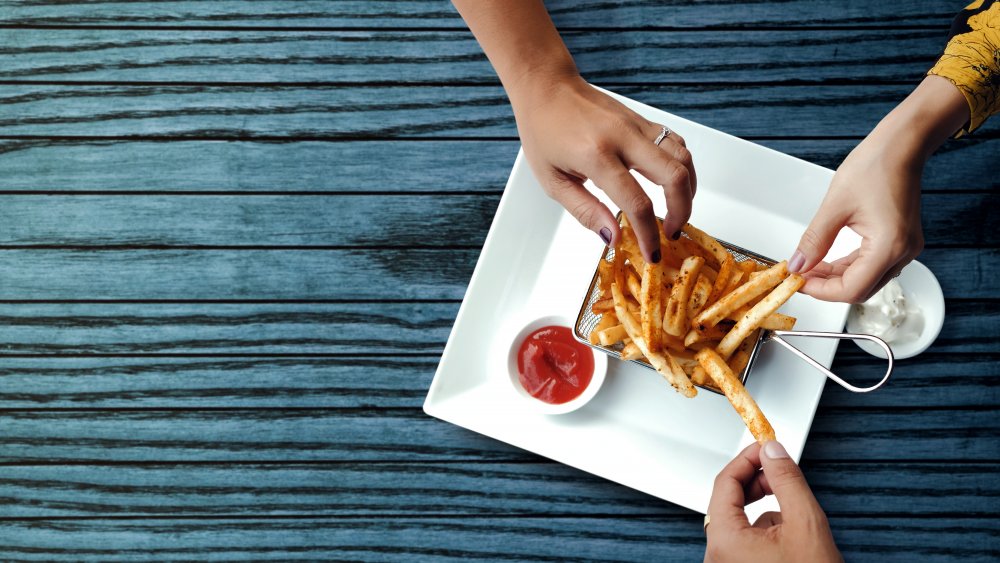Things All Healthy People Do But Never Admit To
Healthy people eat well, exercise regularly, and never miss those yearly physical exams. Perhaps you are one such person or, at least, want to become one. However, even those who are in tip top shape and of sound mind and peak physical health have their faults and flaws. Yes, they're not without their vices or "bad" habits. Maybe they scarf down the occasional bag of Cheetos or skip a workout class and go for happy hour drinks instead.
Obviously, no one — not even the healthiest person on the planet — is perfect. People who prioritize their bodies, minds, and overall well-being are human, after all, and do certain things or have specific habits that they may not be too keen to admit publicly. Why? Perhaps it would tarnish their reputation as a healthy individual, cause undue embarrassment, or incite a feeling of shame (but, seriously, we're looking at you nose pickers!).
Read on to find out all the big and small things that active and adjusted people do, but don't readily want to admit.
Healthy people splurge and enjoy cheat days
You may be able to sustain yourself on spinach and beets, but even strict health food aficionados want to enjoy the occasional candy bar or ice cream cone. In fact, some dietitians and experts embrace the idea of having a "cheat" meal or even a whole day devoted to giving into your most urgent cravings. According to Healthline, this "reward-based diet strategy" permits "brief periods of indulgence" with the idea that you will be incentivized to maintain your healthy eating patterns during diet days, since you will have the opportunity to splurge later.
Even nutritionists have their favorite cheat items. Dietitian Shannon A. Garcia told Fitness that she is usually "inclined to 'revamp,' 'healthify,' 'lighten,' or 'tweak' most indulgent recipes" but she won't even attempt to alter her favorite dessert, peach cobbler. Yes, you can have your cake (or cobbler) and eat it too — and cheat days might be the answer to a more successful and sustainable diet plan.
Healthy people drink their calories
Sometimes, even the most ardent dieters defy the rules and drink more than their fair share of calories. Whether they are sipping sodas or downing deceptively high-cal juices, it is easy to underestimate the waist-bulking abilities of certain liquids. Even a 12-ounce glass of whole milk has 220 calories, per WebMD.
Then there's alcohol. Shanna Levine, a clinical instructor of medicine at Mount Sinai in New York City, told The Healthy that "one piña colada or mudslide could be the equivalent of eating a burger, depending on the mixer." She explained that margarita mix can have "hundreds of calories, and that's before adding alcohol." So if a health-conscious person wants to imbibe without undoing the hard work they put in, she advises opting for wine, beer, or liquor mixed with club soda.
And enjoy yourself. Registered dietician Laura Cipullo revealed to Self that when she wants to enjoy an evening, she doesn't obsess about the calorie count: "I drink my favorite wine of choice — sauvignon blanc — or a margarita on the rocks with salt (no mix, just straight tequila, lime, and agave). I know I can drink two beverages, enjoy the taste, and still get up for yoga the next morning!"
Healthy people sometimes skip the gym
Even gym rats and body builders need a break now and again. According to Healthline, scheduling a rest day into a stringent exercise regime is important. Taking a day off from physical exertion is, however, not the same as throwing in the towel and kicking up your feet. Yes, you deserve the down time, but your body also requires rest to foster muscle growth. It will ensure that your muscles won't fatigue, help restore your energy levels, and prevent unnecessary injury.
Despite it being totally fine to take some down time, a survey of 2,000 Americans found that 19 percent have lied, saying they were working out when they weren't. Still others, though, don't ever take an actual "rest day." Instead, they opt for a low-impact workout.
"[Swimming] allows your body to be weightless, relaxes your joints, and stretches your body in ways you wouldn't be able to on land," Lindsey Corak, a certified personal trainer, told Self. Other smart choices include yoga, Tai Chi, and even rollerblading, per the article. Whatever you do on your rest day, just make sure to take it easy.
Some healthy people neglect to wear sunscreen
You religiously apply SPF before sun-soaked trips to the beach, but do you keep that sunscreen handy during drab winter months or on rainy days? If you answered "no," you're not alone. According to a 2019 survey conducted by the experts at RealSelf, only one in ten people admitted to applying SPF every day year-round, and 47 percent of participants revealed they neglect to use it altogether.
New York City Dermatologist Shilesh Iyer explained to Forbes that the "ultraviolet rays" that lead to "sun damage and skin cancer are always present." The expert continued, saying, "They are independent of cold or hot weather, and are not blocked by clouds. On overcast days, only visible rays (but not UVB rays) from the sun are blocked. The best way to protect the skin is with sun protection."
Still, some arguably healthy people look to strike a balance between sun safety and overprotection. As four experts explained to Coveteur, some people don't want to overload their skin with the dubious chemicals and pore-clogging ingredients in sunscreen every day. What's more, they want to get the good-for-them benefits of Vitamin D absorption — so they choose to use sunscreen only during periods of excessive exposure.
Even health-conscious people pick their noses
If you pick your nose, you are not alone — by a long shot. One study published in The Journal of Clinical Psychiatry found that an astounding 91 percent of people reported that they occasionally dig for gold. So, no, it's not just your child who looks for bats in the cave; it turns out that perfectly healthy, normal people pick their noses, too.
What is the cause of this incessant nostril jabbing? According to Healthline, the reasons may vary. People may pick their nose if it feels too dry or seems too wet. It could also be a nervous reaction or an activity created by sheer boredom.
Most medical experts would agree that nose picking is a rather benign — albeit gross — habit. Professor and lung specialist Freidrich Bischinger, on the other hand, believes that nose pickers are generally healthier, happier people. In fact, he's all for snacking on those green gobs of nose goo. He told Kidspot that "eating the dry remains of what you pull out (of your nose) is a great way of strengthening the body's immune system. Medically, it makes great sense and is a perfectly natural thing to do." Eek.
Lots of healthy people fail to wash their hands properly
The Centers for Disease Control and Prevention advises people to scrub their hands with soap and water for a minimum of 20 seconds to prevent the spread of germs and infection. According to a survey cited in The Atlantic, 96 percent of people claim to wash their hands regularly. Unfortunately, another study highlighted found that 95 percent of people are doing it wrong. Some are frankly phoning it in while others are grossly misinformed about technique. Research assistants observed the habits of 3,749 individuals, and found that only about 67 percent used soap and water, 23 percent simply rinsed, and 10.3 percent skipped the sink altogether.
Lots of people at least attempt to wash their hands after the bathroom, but neglect to do it at other important times. Fitness fanatics, for example, may prioritize health, but forget about hygiene. As noted by Bustle, gyms are full of germs and if you swat your sweaty face with a hand that's been touching communal surfaces, you're just spreading the nasties. "Wash those hands as soon as you finish your workout, and you should be good to go," the publication advised.
Even healthy people eat fast food on the go
Does anyone ever really want to devour a value meal? Or is this dietary choice driven by time constraints and pure convenience? Okay, surely some people crave the occasional Whopper, but most health-conscious people prefer something less fattening and more fulfilling.
Registered dietitians and co-authors of The Healthy, Happy Pregnancy Cookbook, Willow Jarosh and Stephanie Clarke, know it isn't ideal, but sometimes fast food happens. So when they do find themselves eating on the go, they try to choose wisely. They told Eat This, Not That! their go-to is a Wendy's "Junior Hamburger with lettuce, tomato, onion, pickle, mustard or ketchup, as well as a garden side salad with pomegranate vinaigrette and spicy cashews and apple slices, all clocking in at 460 calories in total."
They elaborated that it is a satisfying choice "because it's still a burger, but adding the salad and apples rounds out the nutrition, providing more fiber and a meal that is lower in sodium than most fast food meals." So there you have it — even dietitians scarf down burgers (okay, and salads) in their cars.
Healthy people pass gas and belch often
Healthy people eat — you guessed it — healthy food. And many healthy foods also just so happen to be gaseous. As such, it should come as no surprise that healthy folks may belch and/or fart on the regular.
According to Healthline, the average person passes gas five to 15 times a day. Excessive flatulence, however, can result from eating high fiber fruits and vegetables as they are more difficult for the body to break down, thus creating extra gas. These healthy, wind-creating foods include cauliflower, beans, lentils, cabbage, bran, and Brussels sprouts, among others, per the site. What's even more potentially embarrassing, these "high fiber" farts are often rather stinky, too.
As noted by the Mayo Clinic, these same foods can be responsible for regular belching. If you want to try to reduce your burping without changing your diet, try eating slower and avoid pairing foods with carbonated or caffeinated beverages. And if that doesn't work — the next time you let out a big loud one (from either direction), blame it on all the broccoli. You're just too healthy to stay silent.
Lots of healthy people pick at their skin
Even healthy people have bad habits. They see a blemish and just can't control themselves. If you, too, take it upon yourself to play the part of Dr. Pimple Popper, you're not alone.
As explained by The Cut, when we see something emerging from our skin we innately want to "scratch, pick, pop, peel — essentially grooming ourselves" and we may even "feel a sense of relief and pleasure when we do so." When speaking to the publication, Dr. Diana Fleischman, a clinical sexologist at the University of Portsmouth, likened this sense of satisfaction to one kids may feel when covering their hands with Elmer's Glue and then peeling it all off. "It feels really good ... because it's an adaptive response," she said.
Sanam Hafeez, a New York-based psychologist, told Byrdie that people also pick at their faces as a form of anxiety relief or to feel like they have control. Unfortunately, this nasty habit can lead to scarring or infection — so you may be doing more harm than good. One barely noticeable pimple may turn into an inflamed patch of skin. Many healthy people know from skin-peeling experience that this is a vicious pattern, but it's hard resist temptation.
Plenty of healthy people don't follow a sleep routine
The Centers for Disease Control and Prevention recommends the average adult get at least seven hours of sleep each night. Nevertheless, the CDC found that one in three people are shortchanging themselves on precious Zzzs. As noted by the Cleveland Clinic, healthy individuals who eat well and exercise regularly are potentially "undermining" their efforts by not getting enough sleep.
Sleep disorder expert Dr. Harneet Walia acknowledges that many people bump sleep down on the to-do list. "In our society, nowadays, people aren't getting enough sleep." Why? "Because there are so many other things to do," according to the expert. However, she explained that "if people understand how important adequate sleep is, and how to sleep better, it makes a huge difference."
So what should you do if you want your sleep patterns to be as healthy as your daytime lifestyle habits? Sleep expert Michelle Drerup told the Cleveland Clinic that people should liken sleep to medicine and keep a consistent wakeup time.
Lots of healthy people don't like to admit that they binge-watch TV
Binge-watching multiple seasons of a television series is the new normal thanks to streaming services and a plethora of programming. But, as reported by The Washington Post, watching episode after episode and not moving from the couch for hours (or, you know, days) can have some adverse short- and long-term health effects.
But those who are active and healthy need not feel guilty about the occasional Netflix binge. In fact, some avid exercises know that they can multitask, effectively watching TV while keeping their heart rates up. CNet provided tips for people who like to kill two birds with one stone, advising to use commercial breaks to your advantage; take the opportunity to do continuous jumping jacks or a set of squats. You can also try holding in plank position throughout the credits.
The Biggest Loser's trainers, Steve Cook and Erica Lugo, boast their own fun challenge, reinterpreting a drinking game: "Instead of taking a sip of alcohol each time something is said or happens on the show you are watching, do a jumping jack or a squat," they told Us Weekly. Now, that is how healthy people binge-watch.
Healthy people often spend too much time on their phones
Health-seeking people trying to make smart choices may find themselves sucked into their phones in the pursuit of wellness. Phones have become our exercise trackers, meditation facilitators, and workout coaches. But spending too much time on your phone doing anything has its drawbacks.
First, there are physical consequences; You could develop "Text Claw" or "Cell Phone Elbow," as indicated by Good Housekeeping. This can cause or worsen tendinitis and carpal tunnel syndrome or cause numbness in your fingers. The magazine also warned that staring at your phone can lead to neck pain and be bad for your eyes. As indicated by Forbes, there's also a risk of becoming addicted to your cell phone — and this can cause a decline in your mental health.
Social media is at the core of our obsession. As noted by Body+Soul, if you search the hashtag "running" on Instagram, you'll find a ton of "sweaty selfies." While many share to inspire, some post for outside motivation (aka likes). This is less productive. "If you're too heavily reliant on external motivators you hand that motivation reinforcement on to others and if the comments drop, so too may the motivation," explained sports psychologist Dr Joann Lukins.
Even healthy people double dip
Many of us feel little shame double dipping our French fries with friends or scooping a chip into a communal bowl of queso more than once. You're healthy, so what's the problem?
If you have ever seen the famous double-dipping episode of Seinfeld, you know that this can be a hotly debated topic with lots of people falling on both sides of the argument. A survey by hummus brand Sabra (via New York Post) found that 31 percent of people admitted to double-dipping, and, of that group, 69 percent thought it was okay to do it both at home or in a social party setting.
Well, it turns out that this common and seemingly harmless habit is pretty nasty — even if you think you are healthy and germ-free. A 2009 study published in the Journal of Food Safety found that bacteria was significantly bolstered after an individual dunked a pre-bitten chip into a dip for a second round. Interestingly, the bacteria count varied based on type of dip. Salsa fostered more growth whereas chocolate and cheese weren't as readily affected. The more you know, right?
